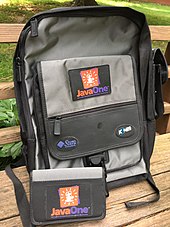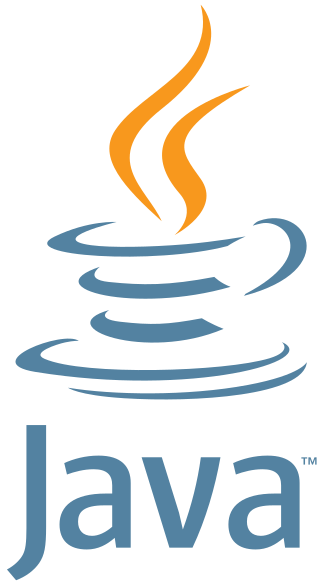
Java is a high-level, class-based, object-oriented programming language that is designed to have as few implementation dependencies as possible. It is a general-purpose programming language intended to let programmers write once, run anywhere (WORA), meaning that compiled Java code can run on all platforms that support Java without the need to recompile. Java applications are typically compiled to bytecode that can run on any Java virtual machine (JVM) regardless of the underlying computer architecture. The syntax of Java is similar to C and C++, but has fewer low-level facilities than either of them. The Java runtime provides dynamic capabilities that are typically not available in traditional compiled languages.

Oracle Corporation is an American multinational computer technology company headquartered in Austin, Texas, United States. In 2020, Oracle was the third-largest software company in the world by revenue and market capitalization. In 2023, the company’s seat in Forbes Global 2000 was 80. The company sells database software and cloud computing. Oracle's core application software is a suite of enterprise software products, such as enterprise resource planning (ERP) software, human capital management (HCM) software, customer relationship management (CRM) software, enterprise performance management (EPM) software, Customer Experience Commerce(CX Commerce) and supply chain management (SCM) software.

Sun Microsystems, Inc. was an American technology company that sold computers, computer components, software, and information technology services and created the Java programming language, the Solaris operating system, ZFS, the Network File System (NFS), and SPARC microprocessors. Sun contributed significantly to the evolution of several key computing technologies, among them Unix, RISC processors, thin client computing, and virtualized computing. Notable Sun acquisitions include Cray Business Systems Division, Storagetek, and Innotek GmbH, creators of VirtualBox. Sun was founded on February 24, 1982. At its height, the Sun headquarters were in Santa Clara, California, on the former west campus of the Agnews Developmental Center.

Jakarta EE, formerly Java Platform, Enterprise Edition and Java 2 Platform, Enterprise Edition (J2EE), is a set of specifications, extending Java SE with specifications for enterprise features such as distributed computing and web services. Jakarta EE applications are run on reference runtimes, which can be microservices or application servers, which handle transactions, security, scalability, concurrency and management of the components they are deploying.
Java Platform, Micro Edition or Java ME is a computing platform for development and deployment of portable code for embedded and mobile devices. Java ME was formerly known as Java 2 Platform, Micro Edition or J2ME.
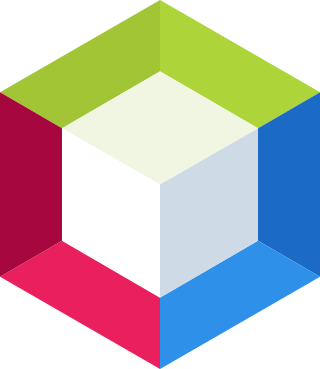
NetBeans is an integrated development environment (IDE) for Java. NetBeans allows applications to be developed from a set of modular software components called modules. NetBeans runs on Windows, macOS, Linux and Solaris. In addition to Java development, it has extensions for other languages like PHP, C, C++, HTML5, and JavaScript. Applications based on NetBeans, including the NetBeans IDE, can be extended by third party developers.
The Worldwide Developers Conference (WWDC) is an information technology conference held annually by Apple Inc. The conference is usually held at Apple Park in California. The event is usually used to showcase new software and technologies in the macOS, iOS, iPadOS, watchOS, and tvOS families as well as other Apple software; new hardware products are sometimes announced as well. WWDC is also an event hosted for third-party software developers that work on apps for iPhones, iPads, Macs, and other Apple devices. Attendees can participate in hands-on labs with Apple engineers and attend in-depth sessions covering a wide variety of topics.

OpenSolaris is a discontinued open-source computer operating system based on Solaris and created by Sun Microsystems. It was also, perhaps confusingly, the name of a project initiated by Sun to build a developer and user community around the eponymous operating system software.
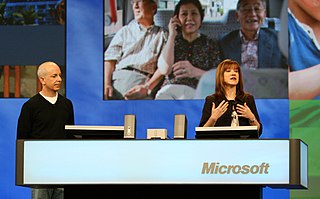
Microsoft's Professional Developers Conference (PDC) was a series of conferences for software developers; the conference was held infrequently to coincide with beta releases of the Windows operating system, and showcased topics of interest to those developing hardware and software for the new version of Windows.

The George R. Moscone Convention Center, popularly known as the Moscone Center, is the largest convention and exhibition complex in San Francisco, California, United States. The complex consists of three main halls spread out across three blocks and 87 acres (35 ha) in the South of Market neighborhood. The convention center originally opened in 1981. It is named after former San Francisco mayor George Moscone, who was assassinated in November 1978.
java.net was a Java technology related community website. It also offered a web-based source code repository for Java projects. It was shut down in April 2017.

Java is a set of computer software and specifications that provides a software platform for developing application software and deploying it in a cross-platform computing environment. Java is used in a wide variety of computing platforms from embedded devices and mobile phones to enterprise servers and supercomputers. Java applets, which are less common than standalone Java applications, were commonly run in secure, sandboxed environments to provide many features of native applications through being embedded in HTML pages.
OpenJDK is a free and open-source implementation of the Java Platform, Standard Edition. It is the result of an effort Sun Microsystems began in 2006. The implementation is licensed under the GPL-2.0-only with a linking exception. Were it not for the GPL linking exception, components that linked to the Java Class Library would be subject to the terms of the GPL license. OpenJDK is the official reference implementation of Java SE since version 7.

JavaFX is a software platform for creating and delivering desktop applications, as well as rich web applications that can run across a wide variety of devices. JavaFX has support for desktop computers and web browsers on Microsoft Windows, Linux, and macOS, as well as mobile devices running iOS and Android, through Gluon Mobile.
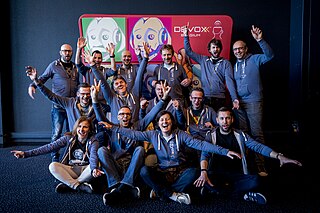
Devoxx is a developers community conference series created in 2002 by Stephan Janssen, organized by the Belgian Java User Group (BeJUG). The conference takes place every year in Belgium around October or November. With over 2,800 attendees in 2006, JavaPolis became the biggest vendor-independent Java conference in the world. In 2008, the conference was renamed Devoxx.

WaveMaker is a Java-based low-code development platform designed for building software applications and platforms. The company, WaveMaker Inc., is based in Mountain View, California. The platform is intended to assist enterprises in speeding up their application development and IT modernization initiatives through low-code capabilities. Additionally, for independent software vendors (ISVs), WaveMaker serves as a customizable low-code component that seamlessly integrates into their products.

OpenAM is an open-source access management, entitlements and federation server platform. Now it is supported by Open Identity Platform Community.

An application programming interface (API) is a way for two or more computer programs or components to communicate with each other. It is a type of software interface, offering a service to other pieces of software. A document or standard that describes how to build or use such a connection or interface is called an API specification. A computer system that meets this standard is said to implement or expose an API. The term API may refer either to the specification or to the implementation. Whereas a system's user interface dictates how its end-users interact with the system in question, its API dictates how to write code that takes advantage of that system's capabilities.

Microsoft Build is an annual conference event held by Microsoft, aimed at software engineers and web developers using Windows, Microsoft Azure and other Microsoft technologies. First held in 2011, it serves as a successor for Microsoft's previous developer events, the Professional Developers Conference and MIX. The attendee price was (US)$2,195 in 2016, up from $2,095 in 2015. It sold out quickly, within one minute of the registration site opening in 2016.
Serverless computing is a cloud computing execution model in which the cloud provider allocates machine resources on demand, taking care of the servers on behalf of their customers. "Serverless" is a misnomer in the sense that servers are still used by cloud service providers to execute code for developers. However, developers of serverless applications are not concerned with capacity planning, configuration, management, maintenance, fault tolerance, or scaling of containers, VMs, or physical servers. Serverless computing does not hold resources in volatile memory; computing is rather done in short bursts with the results persisted to storage. When an app is not in use, there are no computing resources allocated to the app. Pricing is based on the actual amount of resources consumed by an application. It can be a form of utility computing.


